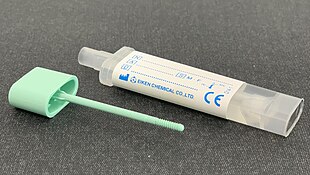Medicine:Fecal immunochemical test
From HandWiki
Short description: Diagnostic test for colorectal cancer
| Fecal immunochemical test | |
|---|---|
 Faecal Immunochemical Testing | |
Fecal Immunochemical Test (FIT) is a diagnostic technique that examines stool samples for traces of non-visible blood, which could potentially indicate conditions including bowel cancer.[1] Symptoms which could be caused by bowel cancer and suggest a FIT include a change in bowel habit, anaemia, unexplained weight loss, and abdominal pain.[2][3]
Note: Blood in stools does not always mean you have bowel or anal cancer, it could be from other bowel diseases such as Ulcerative Colitis, Crohn's or even Piles.
A 2022 UK guideline recommends the use of a FIT threshold of fHb ≥10 µg Hb/g to select patients with symptoms for an urgent referral for colorectal cancer investigation.[4]
References
- ↑ "Bowel Cancer: Testing for blood in your poo using the FIT test". Cancer Research UK. 6 December 2021. https://www.cancerresearchuk.org/about-cancer/bowel-cancer/getting-diagnosed/tests/FIT.
- ↑ Quintero, Enrique; Castells, Antoni; Bujanda, Luis et al. (23 February 2012). "Colonoscopy versus Fecal Immunochemical Testing in Colorectal-Cancer Screening". New England Journal of Medicine (Massachusetts Medical Society) 366 (8): 697–706. doi:10.1056/nejmoa1108895. ISSN 0028-4793. PMID 22356323.
- ↑ "Fecal immunochemical test (FIT): MedlinePlus Medical Encyclopedia" (in en). https://medlineplus.gov/ency/patientinstructions/000704.htm.
- ↑ Monahan, Kevin J; Davies, Michael M; Abulafi, Muti et al. (12 July 2022). "Faecal immunochemical testing (FIT) in patients with signs or symptoms of suspected colorectal cancer (CRC): a joint guideline from the Association of Coloproctology of Great Britain and Ireland (ACPGBI) and the British Society of Gastroenterology (BSG)". Gut 71 (10): 1939–1962. doi:10.1136/gutjnl-2022-327985. ISSN 0017-5749. PMID 35820780.
 |

